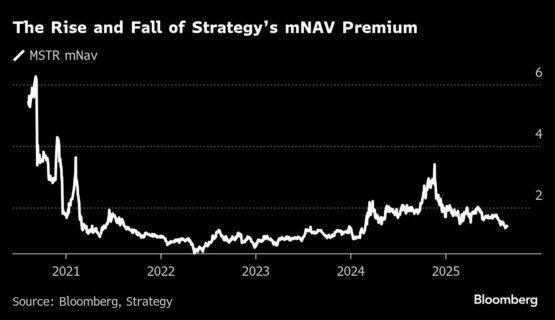Michael Saylor Faces Market Backlash as Bitcoin Premium Plummets
Michael Saylor’s once-lauded Bitcoin initiative is facing significant market pushback, prompting scrutiny regarding the viability of the corporate treasury model he established.
Shares of Strategy, which was previously MicroStrategy, have dropped 15% this month, diminishing much of the premium the company previously enjoyed from its Bitcoin holdings. Once a key indicator of crypto sentiment, the company is now encountering renewed skepticism.
Central to this concern are the firm’s financing strategies. Strategy’s new preferred stock—intended as its primary means for future Bitcoin purchases—has seen lukewarm demand. A recent sale generated only $47 million, falling well short of Saylor’s ambitious plans for a substantial capital raise. To fill this gap, the company has reverted to issuing common shares, contradicting earlier commitments to minimize dilution. This shift has unsettled investors.
The implications extend well beyond a single company. Saylor’s approach—raising debt and equity, acquiring Bitcoin, and benefitting from market premiums—has motivated numerous treasury firms, collectively holding over $108 billion, or 4.7% of Bitcoin’s supply, according to BitcoinTreasuries.net. If Strategy’s premium diminishes, it could undermine confidence in the model itself.
“The diminishing premium is a natural reaction to increased competition and alternative methods for traders to access digital assets,” remarked Jake Ostrovskis, principal analyst at Wintermute’s OTC Desk. “Moreover, revising guidance on share issuance below 2.5x mNAV has prompted short-term reevaluations of the corporate strategy.”

Strategy was never just a stock; it evolved into a proof of concept: a corporate balance sheet could be utilized as a speculative engine—a continual source of demand for Bitcoin. This bet reshaped market perceptions of corporate finance and sparked a surge of imitators.
Once a modest enterprise software firm, Strategy, previously MicroStrategy, transformed in 2020 when Saylor stunned Wall Street by investing in Bitcoin. The stock shifted from earnings potential to trading on a multiple of its Bitcoin holdings, termed mNAV.
ADVERTISEMENT
CONTINUE READING BELOW
This multiple has fluctuated before. It declined during the Terra-Luna crisis, rebounded to 3.4 after Donald Trump’s re-election, and now stands at 1.57. However, this time is distinct: the drop is occurring not during a crypto winter but amid a boom. Treasury-style companies are multiplying, yet the originator, Strategy, is now issuing shares at a declining multiple, and the market is starting to push back.
In late July, the company committed to refraining from issuing shares at a multiple below 2.5, with limited exceptions. Just two weeks later, this guidance was relaxed, and on August 25, the company sold nearly 900,000 new shares.
This move was seen by some investors online as a breach of trust. Issuing equity below mNAV now poses the risk of a negative cycle: a declining stock affects the ability to acquire Bitcoin, weakening confidence and further reducing the premium.
Online, Saylor addressed the criticism, sharing an AI-generated image of himself walking past a giant bear. The company did not respond to requests for commentary. Supporters argue that maintaining flexibility may advantage the company in securing inclusion in the S&P 500 or if Bitcoin experiences another surge.
The broader group faces pressures. Capriole Investments reports that nearly a third of publicly traded companies holding Bitcoin are now trading below the value of those reserves. Smaller firms are especially at risk: limited liquidity makes equity issuance challenging, and reliance on convertible notes incurs interest burdens and maturity risks.
Strategy has previously stated its intention to alleviate all convertible notes over the next four years and transition to preferred stock—securities whose principal will not come due. Most smaller peers, lacking both scale and creditworthiness, cannot replicate this structure.
“What happens when Bitcoin drops 50%?” posed Charles Edwards, founder of Capriole. “Enthusiasm for treasury companies will diminish, mNAVs will compress, and hundreds of companies will begin to reconsider their treasury strategies altogether.”
ADVERTISEMENT:
CONTINUE READING BELOW
The landscape has also become increasingly crowded. In the past year, influencers and politically connected individuals have rapidly launched crypto vehicles through SPACs and reverse mergers. Many lack the scale or trading liquidity of Strategy and may prove less resilient in a downturn.
“Is this market inflated? I believe it is,” stated Jack Mallers, co-founder and CEO of Twenty One Capital Inc., during a Bloomberg TV interview. “What we learned is that creating a Bitcoin treasury company is not a unique opportunity. Anyone can register a business, attempt to go public, and try to raise funds to buy Bitcoin.”
A further challenge has surfaced with the advent of spot Bitcoin ETFs. Initially, both Strategy and the exchange-traded funds benefitted from a post-election rally. However, the comparison has become less favorable. Funds provide investors exposure to Bitcoin without the governance risks, leverage, or dilution associated with corporate structures.
“Investors are momentum-driven,” explained Campbell Harvey, a Duke University professor. “When the price rises, they buy. When it falls or remains stable, enthusiasm declines.”
Simultaneously, attention is shifting towards other digital assets like Ether and Solana, which some perceive as more suitable for decentralized finance. Ether-focused treasuries alone have committed over $19 billion.
Bitcoin has retreated from highs earlier this month but remains supported by institutional investments. Numerous newer treasury firms purchased at prices above $100,000 and lack the underlying businesses to sustain them should the market shift.
“There is nothing behind Bitcoin but sentiment,” stated Hilary Allen, a law professor at American University.
© 2025 Bloomberg
Follow Moneyweb’s comprehensive finance and business updates on WhatsApp here.

